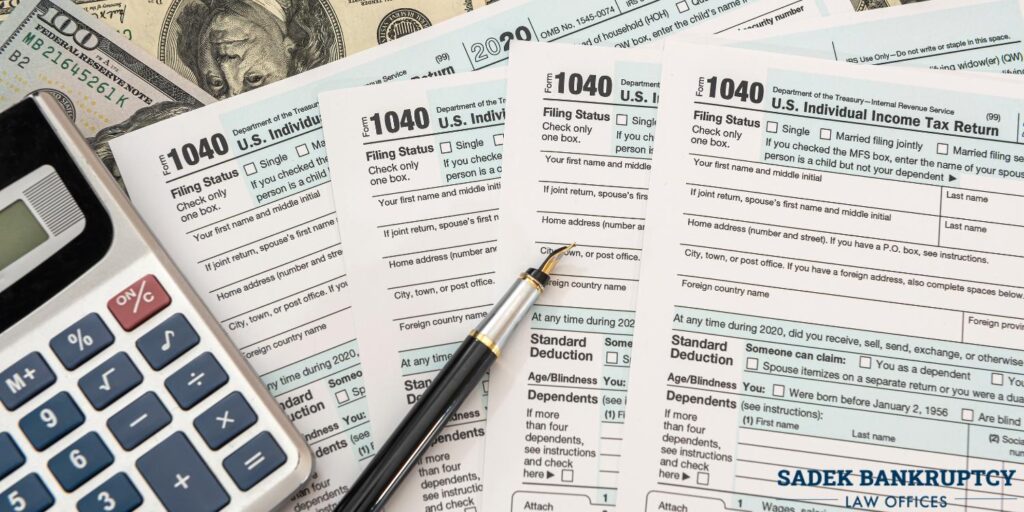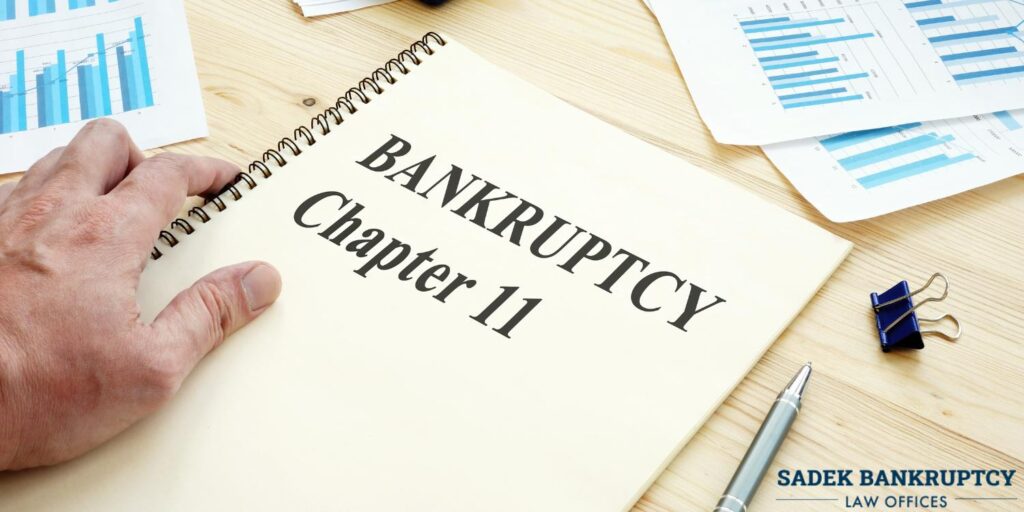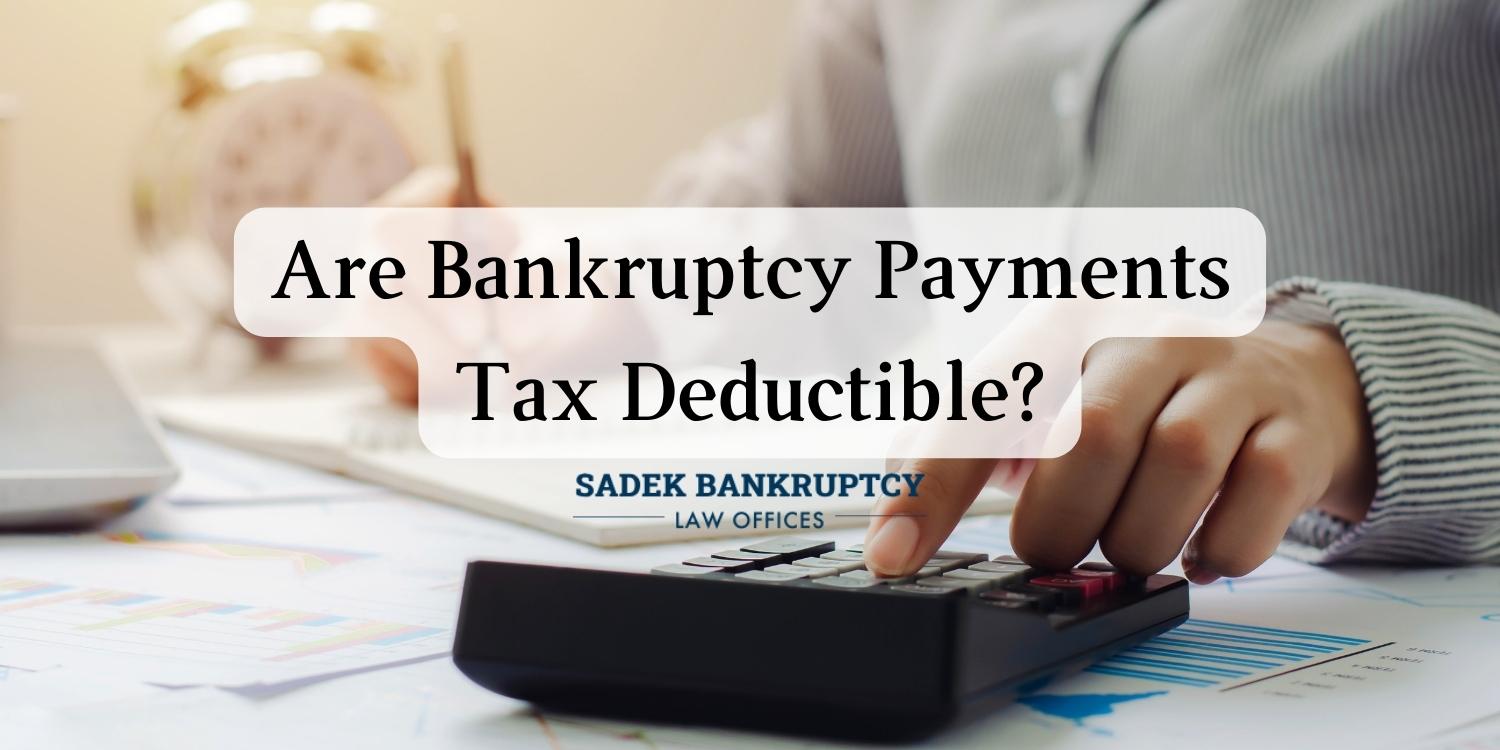Understandably, many bankruptcy filers want to know what their potential tax consequences will be after they file. Bankruptcy can be the fresh start that people need to reclaim their financial independence, but are bankruptcy payments tax deductible? And what are the other tax implications that filers should be aware of? Speaking with a qualified Philadelphia bankruptcy attorney can help you better understand how filing for bankruptcy can affect filing your taxes.
For individuals, if debts are forgiven through bankruptcy, the amount forgiven may be considered taxable income by the IRS unless an exception applies. However, under the Bankruptcy Code, certain types of debt discharge, such as through Chapter 7 bankruptcy for personal liabilities in the bankruptcy estate, are typically excluded from taxable income. This exclusion generally applies to debts discharged in bankruptcy to the extent the debtor is insolvent.
In other words, debt discharged through bankruptcy is not considered taxable income per IRS Topic 401.
In the case of a business filing for bankruptcy, any cancellation of debt (COD) income resulting from the discharge of indebtedness may be taxable unless certain exceptions or exclusions apply. Businesses should be aware of the tax consequences of restructuring or discharging debts through bankruptcy and consult with tax professionals to understand their specific situation.
Additionally, tax attributes such as carryovers for net operating losses (NOLs) and capital losses may be affected by bankruptcy proceedings. The treatment of these attributes can vary depending on the type of bankruptcy and the specific circumstances. An individual or business may be eligible for a tax deduction, and we recommend speaking with an attorney to determine your eligibility.
Can You Claim Bankruptcy on Taxes?
Individuals cannot directly “claim a bankruptcy filing” on their taxes in the same way they claim deductions or credits. However, the tax implications of filing for bankruptcy can be significant and must be addressed when filing taxes.
When debts are discharged through bankruptcy, the amount forgiven may generally be considered taxable income by the IRS, unless an exception applies. However, under the Bankruptcy Code, certain types of debt discharge, such as through Chapter 7 bankruptcy for personal liabilities, are typically excluded from taxable income. This exclusion generally applies to debts discharged in bankruptcy to the extent the debtor is insolvent.
In the case of a business filing for bankruptcy, any cancellation of debt (COD) income resulting from the discharge of indebtedness may be taxable unless certain exceptions or exclusions apply. Under IRS regulations, miscellaneous deductions must exceed 2% of one’s adjusted gross income to be claimed as a deduction.
Chapter 13 Tax Return Requirements

In Chapter 13 bankruptcy, individuals must continue to file their income tax returns on time and accurately report all income. This includes wages, self-employment earnings, investment income, and any other sources of income. Tax refunds may need to be disclosed, and in some cases, a portion of these refunds might be required to be contributed to the Chapter 13 repayment plan.
Debtors should maintain meticulous records of income, bankruptcy legal expenses, and tax-related documents throughout the bankruptcy process. These records are crucial for complying with tax return requirements and demonstrating adherence to the terms of the repayment plan.
Additionally, debtors may be required to turn over tax refunds to the bankruptcy trustee for distribution to creditors, depending on the specifics of the repayment plan and local laws. However, there are instances where debtors may be allowed to retain a portion of their tax refunds, provided it doesn’t interfere with the successful completion of the repayment plan.
Are Chapter 13 Payments Tax Deductible?
Chapter 13 bankruptcy payments are not typically considered tax deductions in the same way that mortgage interest or charitable donations might be. However, the portion of Chapter 13 payments that repay mortgage interest and real estate taxes are tax deductible.
Chapter 13 bankruptcy involves the repayment of debts through a court-approved repayment plan, and the payments made under this plan are not considered deductible expenses for federal income tax purposes.
Importantly, bankruptcy laws allow filers to retain certain property and assets that are exempt from seizure by the trustee. These assets are known as the bankruptcy estate. If the bankruptcy estate’s gross income meets the taxable threshold set by the IRS, the bankruptcy trustee will file a separate tax return for the bankruptcy estate. This is separate from the filer’s personal tax return.
What Types of Debt Must Be Repaid Under Chapter 13?
Under Chapter 13 bankruptcy, debtors propose a repayment plan to the court to gradually repay their debts over a period typically lasting three to five years. While Chapter 13 offers more flexibility than Chapter 7, which involves liquidation of assets to pay creditors, not all debts are treated equally within a Chapter 13 repayment plan.
Priority debts, such as taxes and domestic support obligations like child support and alimony, must typically be repaid in full under the Chapter 13 plan. These debts are given priority status because of their legal precedence over other obligations.
Secured debts, such as mortgages or car loans, are also commonly included in Chapter 13 repayment plans. Debtors may have the option to retain the collateral securing these debts while catching up on missed payments over the plan’s duration. Secured debts must be repaid according to the terms outlined in the plan.
Additionally, certain types of debts, such as past-due payments on secured debts and priority debts, may need to be paid in full through the plan. However, unsecured debts, like credit card debt or medical bills, may only be partially paid or even discharged entirely, depending on the debtor’s disposable income and assets.
Chapter 7 Tax Return Requirements
In Chapter 7 bankruptcy, a debtor’s non-exempt assets are sold or liquidated to pay off creditors. Any remaining eligible debts are typically discharged, and the debtor is no longer obligated to pay those debts.
Debtors in Chapter 7 bankruptcy are generally required to continue filing their tax returns on time during the bankruptcy process. Failure to file tax returns can have serious consequences, including dismissal of the bankruptcy case.
Debtors must accurately report all income on their tax returns, including wages, self-employment income, investment income, and any other sources of income. This information may be used to determine the debtor’s eligibility for Chapter 7 bankruptcy and their ability to repay creditors.
Debtors must disclose all assets and liabilities on their bankruptcy petition, including any tax refunds owed to them. Depending on the specific circumstances, tax refunds may be considered part of the debtor’s bankruptcy estate and subject to distribution to creditors.
Any tax refunds received by the debtor during the bankruptcy process may be subject to review by the bankruptcy trustee. Depending on the timing of the bankruptcy filing and the specific laws in the jurisdiction, tax refunds may be considered part of the bankruptcy estate and used to repay creditors.
As far as deductions go, most cases do not allow filers to deduct legal fees related to personally paid legal expenses. However, it’s important to speak with an attorney to verify which deductions bankruptcy filers are eligible for.
What Are the Chapter 11 Tax Consequences?

Chapter 11 bankruptcy, often referred to as reorganization bankruptcy, is primarily utilized by businesses but can also be filed by individuals with significant debts. The tax consequences of Chapter 11 bankruptcy can be complex and varied, impacting both the debtor and its creditors.
For the debtor, one significant tax consequence of Chapter 11 bankruptcy is the potential recognition of cancellation of debt (COD) income. When business expenses and debts are discharged or restructured through bankruptcy, any forgiven amount may be considered taxable income by the IRS. However, under certain circumstances, the debtor may be able to exclude this COD income from taxable income, such as by demonstrating insolvency.
Additionally, the treatment of tax attributes, such as net operating losses (NOLs) and tax credits, may be affected by Chapter 11 bankruptcy. The debtor may be able to carry forward these tax attributes to offset future taxable income, potentially reducing its tax liability post-bankruptcy.
Additionally, bankruptcy legal fees paid during the filing process can be expensive. The IRS and the Bankruptcy Code may allow for deductions of specific legal expenses, although this is uncommon. Speak with your attorney about which deductions you are eligible for to better understand your filing options.
For creditors, the tax consequences of Chapter 11 bankruptcy depend on how their claims are treated under the reorganization plan. Creditors who receive payments or property as part of the plan may need to recognize income for tax purposes. However, certain provisions of the Bankruptcy Code may allow creditors to defer recognition of income until they receive payments or property, or until the reorganization plan is confirmed.
Contact a Philadelphia Bankruptcy Lawyer at Sadek Law Today
While bankruptcy payments themselves may not be tax-deductible, understanding the broader tax implications of bankruptcy is crucial for individuals seeking financial relief. At Sadek Law, we recognize the complexities of navigating tax and bankruptcy law, especially in the Philadelphia area.
Our experienced bankruptcy attorneys are here to provide personalized guidance and support, helping you navigate the intricacies of bankruptcy proceedings while minimizing tax liabilities. Whether you’re considering business or personal bankruptcy, trust Sadek Law to provide the expertise and advocacy you need to achieve a fresh financial start. Contact us today at 215-545-0008 to schedule a free consultation and take the first step towards a brighter financial future.





